【BBC六分钟英语】幸福是遗传的吗?

【英文脚本】
BBC LEARNING ENGLISH
6 Minute English Is happiness genetic?
Transcript
Note: This is not a word for word transcript
Dan
Hello and welcome to 6 Minute English– the show that brings you an interesting topic, authentic listening practice and six new items of vocabulary. I’m Dan…
Neil
And I’m Neil. In this episode we’ll be discussing if happiness is genetic
Dan
How happy would you say you are Neil?
Neil
I’m pretty happy I think. Why do you ask?
Dan
Well, in March this year the UN published its fifth world happiness report.
Neil
Is that the one that ranks all of the countries based on how happy they are?
Dan
You’ve heard of it then. Over all there are 155 countries included, and Norway came top of them all, overtaking Denmark, which was the leader for the years 2012 to 2016.
Neil
Well what about the UK?
Dan
Ah, well that’s this week’s questions, isn’t it? Where did the UK place? a) in the top 10 b) between 11th and 20th c) after 21st
Neil
Well, I’m going to say c) after 21st
Dan
Ok, you know the drill. No answers until the end of the show.
Neil
So, Norway, eh? And Denmark the previous year? They’re neighbours!
Dan
Yes. In fact, for the last 5 years, the results have been pretty much the same. Nordic countries tend to dominate the top of the table.
Neil
Dominate meaning ‘control’. Ok, well how are the results decided?
Dan
It’s very simple. They ask 1000 people in each country a single subjective question.
Neil
Subjective means ‘based on personal experience, beliefs or feelings’. …Well, what’s the question?
Dan
Imagine a ladder, with steps numbered from 0 at the bottom to 10 at the top. The top of the ladder represents the best possible life for you and the bottom of the ladder represents the worst possible life for you. On which step of the ladder would you say you personally feel you stand at this time?
Neil
That’s actually quite simple.
Dan
Yep. The Nordic countries all score an average close to 7.5 out of 10.
Neil
So we have a number of neighbouring countries which all claim to be extremely happy. There must be a connection….is it the weather?
Dan
Well, that’s a logical conclusion, but there is another idea. I’ll let Professor Andrew Oswald from the University of Warwick explain.
Professor Andrew Oswald, University of Warwick
We think that there is a genetic component, in part, to why the Danes do so well coming so regularly at the head of happiness international league tables. It does appear from the data that the Danes have the smallest amount of the, you might say, dangerous, short kind of genetic pattern. So they may have a kind of inoculation against the possibility of depression.
Neil
So, professor Oswald mentioned there is a genetic component, or part, to Danish DNA which gives them an inoculation, or illness protection, against depression and sadness.
Dan
Yep. All of the Nordic countries have a similar make-up.
Neil
But he said ‘in part’. That means it doesn’t explain everything. So, there’s something missing.
Dan
There’s no fooling you! Michael Booth has written a book about Nordic happiness. He has another theory.
INSERT
Michael Booth, Author There are so many reasons why the Danes are happy, why they’re content that have nothing to do with DNA. Of course they’re happy! They’re rich! They’re sexy! They’re funny! They don’t work that much!
Neil
Ah. So being rich, funny, sexy and not working much is why they are content, meaning ‘satisfied’. That sounds a bit like you, Dan.
Dan
I can’t publicly comment on that Neil, I’m sorry! But there is one more piece we’re missing. Hygge. It’s a loanword and only just appeared in the British dictionaries. We don’t have a direct translation, but it basically means cosiness.
Neil
Cosiness, meaning ‘warm, comfortable and safe’.
Dan
Yes. Danes love simple comforts. A warm cosy room, some drinks, some candles and a fire, and they are happy. Maybe that’s the secret.
Neil
Well, the secret to my happiness right now is finding out if I was right in the quiz.
Dan
Oh yes! I asked: Where did the UK place in the World Happiness Report 2017 a) in the top 10 b) between 11th and 20th c) after 21st
Neil
I said c) after 21st
Dan
And I’m afraid you’re wrong my friend. We placed b) between 11th and 20th. We were actually 19th.
Neil
Well, let’s make our listeners happy by going through the vocabulary.
Dan
Ok. First we had dominate. If you dominate something or someone, you control it. It’s quite an aggressive word. You wouldn’t use it for people much. But, give us an example, Neil.
Neil
You can talk about a team dominating play in a sport. Next we had subjective. If something is subjective it is based on personal experience, beliefs or feelings rather than facts, which are objective. What type of things are subjective, Dan?
Dan
Oh, it’s our opinions of art, music, jokes, food. You know, I like sausages and ice-cream but no one else does!
Neil
That’s because it’s disgusting!
Dan
Then we had component. A component is part of something that makes up a larger whole. Televisions and computers have many components in them.
Neil
And a person can be an essential component in a team, like a goal-keeper in football. After that was inoculation. An inoculation is a form of disease protection. It is a synonym of….Dan?
Dan
Vaccination. I went on holiday last year and had to have my inoculations updated. Then we had content.If you are content, you are satisfied and want nothing. What makes you content, Neil?
Neil
A warm sunny day in my garden with a good book. And finally we had cosiness. Cosiness comes from cosy, which means ‘warm, comfortable and safe’. Where’s cosy for you Dan?
Dan
Oh easy. On a freezing cold day, it’s tucked up in bed with a nice cup of tea. And that’s the end of today’s 6 Minute English. Please join us again soon!
Neil
And we are on social media too, of course - Facebook, Twitter, Instagram and YouTube. See you there.
Both
Bye!
【中英文双语脚本】
BBC LEARNING ENGLISH(BBC学习英语)
6 Minute English Is happiness genetic?
6 分钟 英语 幸福是遗传的吗?
Transcript(抄本)
Note: This is not a word for word transcript
注意:这不是逐字记录
Dan(担)
Hello and welcome to 6 Minute English– the show that brings you an interesting topic, authentic listening practice and six new items of vocabulary. I’m Dan…
您好,欢迎来到六分钟英语 – 该节目为您带来一个有趣的话题、真实的听力练习和六个新词汇。我是 Dan…
Neil(尼尔)
And I’m Neil. In this episode we’ll be discussing if happiness is genetic
我是 Neil。在这一集中,我们将讨论幸福是否是遗传的
Dan(担)
How happy would you say you are Neil?
你会说你是 Neil 有多快乐?
Neil(尼尔)
I’m pretty happy I think. Why do you ask?
我觉得我很高兴。你为什么问?
Dan(担)
Well, in March this year the UN published its fifth world happiness report.
今年 3 月,联合国发布了第五份世界幸福报告。
Neil(尼尔)
Is that the one that ranks all of the countries based on how happy they are?
这是根据所有国家的幸福程度对所有国家进行排名的吗?
Dan(担)
You’ve heard of it then. Over all there are 155 countries included, and Norway came top of them all, overtaking Denmark, which was the leader for the years 2012 to 2016.
那时你已经听说过了。总共包括 155 个国家,挪威位居榜首,超过了 2012 年至 2016 年排名第一的丹麦。
Neil(尼尔)
Well what about the UK?
那么英国呢?
Dan(担)
Ah, well that’s this week’s questions, isn’t it? Where did the UK place? a) in the top 10 b) between 11th and 20th c) after 21st
啊,这就是本周的问题,不是吗?英国在哪里?a) 前 10 名 b) 第 11 名和第 20 名之间 c) 第 21 名之后
Neil(尼尔)
Well, I’m going to say c) after 21st
好吧,我要说 c) 在 21 日之后
Dan(担)
Ok, you know the drill. No answers until the end of the show.
好的,你知道怎么做。直到节目结束才有答案。
Neil(尼尔)
So, Norway, eh? And Denmark the previous year? They’re neighbours!
那么,挪威,嗯?前一年的丹麦呢?他们是邻居!
Dan(担)
Yes. In fact, for the last 5 years, the results have been pretty much the same. Nordic countries tend to dominate the top of the table.
是的。事实上,在过去的 5 年里,结果几乎相同。北欧国家往往在积分榜上占据主导地位。
Neil(尼尔)
Dominate meaning ‘control’. Ok, well how are the results decided?
Dominant 的意思是“控制”。好的,那么结果是如何决定的呢?
Dan(担)
It’s very simple. They ask 1000 people in each country a single subjective question.
这很简单。他们向每个国家的 1000 人询问一个主观问题。
Neil(尼尔)
Subjective means ‘based on personal experience, beliefs or feelings’. …Well, what’s the question?
主观是指“基于个人经验、信念或感受”。…那么,问题是什么?
Dan(担)
Imagine a ladder, with steps numbered from 0 at the bottom to 10 at the top. The top of the ladder represents the best possible life for you and the bottom of the ladder represents the worst possible life for you. On which step of the ladder would you say you personally feel you stand at this time?
想象一个梯子,台阶的编号从底部的 0 到顶部的 10。梯子的顶部代表你最好的生活,梯子的底部代表你最糟糕的生活。您认为您个人认为自己此时站在阶梯的哪一步上?
Neil(尼尔)
That’s actually quite simple.
这其实很简单。
Dan(担)
Yep. The Nordic countries all score an average close to 7.5 out of 10.
是的。北欧国家的平均得分都接近 7.5 分(满分 10 分)。
Neil(尼尔)
So we have a number of neighbouring countries which all claim to be extremely happy. There must be a connection….is it the weather?
因此,我们有许多邻国都声称非常高兴。一定有联系….是天气吗?
Dan(担)
Well, that’s a logical conclusion, but there is another idea. I’ll let Professor Andrew Oswald from the University of Warwick explain.
嗯,这是一个合乎逻辑的结论,但还有另一个想法。我让华威大学的 Andrew Oswald 教授来解释一下。
Professor Andrew Oswald, University of Warwick(AndrewOswald教授,华威大学)
We think that there is a genetic component, in part, to why the Danes do so well coming so regularly at the head of happiness international league tables. It does appear from the data that the Danes have the smallest amount of the, you might say, dangerous, short kind of genetic pattern. So they may have a kind of inoculation against the possibility of depression.
我们认为,丹麦人表现如此出色,经常在幸福国际排行榜上名列前茅,部分原因是有遗传因素的。从数据来看,丹麦人确实拥有最少的,你可以说是危险的、短的遗传模式。所以他们可能有一种针对抑郁症可能性的疫苗。
Neil(尼尔)
So, professor Oswald mentioned there is a genetic component, or part, to Danish DNA which gives them an inoculation, or illness protection, against depression and sadness.
因此,奥斯瓦尔德教授提到,丹麦人的 DNA 有一个遗传成分或部分,这使他们能够预防抑郁和悲伤。
Dan(担)
Yep. All of the Nordic countries have a similar make-up.
是的。所有北欧国家都有类似的构成。
Neil(尼尔)
But he said ‘in part’. That means it doesn’t explain everything. So, there’s something missing.
但他说的是“部分”。这意味着它并不能解释所有问题。所以,缺少了一些东西。
Dan(担)
There’s no fooling you! Michael Booth has written a book about Nordic happiness. He has another theory.
没有骗你!迈克尔·布斯 (Michael Booth) 写了一本关于北欧幸福的书。他有另一种理论。
INSERT(插入)
Michael Booth, Author There are so many reasons why the Danes are happy, why they’re content that have nothing to do with DNA. Of course they’re happy! They’re rich! They’re sexy! They’re funny! They don’t work that much!
Michael Booth, 作家 丹麦人快乐的原因有很多,他们为什么满足于与 DNA 无关的原因。他们当然很高兴!他们很有钱!他们很性感!他们很有趣!他们没有那么多工作!
Neil(尼尔)
Ah. So being rich, funny, sexy and not working much is why they are content, meaning ‘satisfied’. That sounds a bit like you, Dan.
啊。所以有钱、有趣、性感和不怎么工作就是他们满足的原因,意思是“满意”。这听起来有点像你,Dan。
Dan(担)
I can’t publicly comment on that Neil, I’m sorry! But there is one more piece we’re missing. Hygge. It’s a loanword and only just appeared in the British dictionaries. We don’t have a direct translation, but it basically means cosiness.
我不能公开评论那个 Neil,对不起!但我们还缺少一块。海格。这是一个外来词,刚刚出现在英国词典中。我们没有直接的翻译,但它基本上意味着舒适。
Neil(尼尔)
Cosiness, meaning ‘warm, comfortable and safe’.
Cosness,意为“温暖、舒适和安全”。
Dan(担)
Yes. Danes love simple comforts. A warm cosy room, some drinks, some candles and a fire, and they are happy. Maybe that’s the secret.
是的。丹麦人喜欢简单的舒适。一个温暖舒适的房间,一些饮料,一些蜡烛和火堆,他们很开心。也许这就是秘密。
Neil(尼尔)
Well, the secret to my happiness right now is finding out if I was right in the quiz.
好吧,我现在快乐的秘诀是找出我在测验中是否正确。
Dan(担)
Oh yes! I asked: Where did the UK place in the World Happiness Report 2017 a) in the top 10 b) between 11th and 20th c) after 21st
哦,是的!我问:英国在 2017 年世界幸福报告中的位置 a) 前 10 名 b) 第 11 名和第 20 名之间 c) 第 21 名之后
Neil(尼尔)
I said c) after 21st
我说 c) 21 日之后
Dan(担)
And I’m afraid you’re wrong my friend. We placed b) between 11th and 20th. We were actually 19th.
恐怕你错了,我的朋友。我们将 b) 排在第 11 位和第 20 位之间。我们实际上是第 19 名。
Neil(尼尔)
Well, let’s make our listeners happy by going through the vocabulary.
好吧,让我们通过浏览词汇来让我们的听众满意。
Dan(担)
Ok. First we had dominate. If you dominate something or someone, you control it. It’s quite an aggressive word. You wouldn’t use it for people much. But, give us an example, Neil.
还行。首先,我们占据了主导地位。如果你支配某事或某人,你就会控制它。这是一个相当激进的词。你不会经常用它来给人用。但是,给我们举个例子,Neil。
Neil(尼尔)
You can talk about a team dominating play in a sport. Next we had subjective. If something is subjective it is based on personal experience, beliefs or feelings rather than facts, which are objective. What type of things are subjective, Dan?
你可以谈论一支球队在一项运动中占据主导地位。接下来我们有了主观。如果某件事是主观的,那么它就是基于个人经验、信念或感受,而不是客观的事实。什么类型的事情是主观的,Dan?
Dan(担)
Oh, it’s our opinions of art, music, jokes, food. You know, I like sausages and ice-cream but no one else does!
哦,这是我们对艺术、音乐、笑话、食物的看法。你知道,我喜欢香肠和冰淇淋,但其他人都不喜欢!
Neil(尼尔)
That’s because it’s disgusting!
那是因为它太恶心了!
Dan(担)
Then we had component. A component is part of something that makes up a larger whole. Televisions and computers have many components in them.
然后我们有了组件。组件是构成更大整体的事物的一部分。电视和计算机包含许多组件。
Neil(尼尔)
And a person can be an essential component in a team, like a goal-keeper in football. After that was inoculation. An inoculation is a form of disease protection. It is a synonym of….Dan?
一个人可以成为球队的重要组成部分,就像足球中的守门员一样。之后是接种。接种是一种疾病保护形式。它是 ….Dan?
Dan(担)
Vaccination. I went on holiday last year and had to have my inoculations updated. Then we had content.If you are content, you are satisfied and want nothing. What makes you content, Neil?
接种疫苗。我去年去度假了,不得不更新我的疫苗接种。然后我们有了内容。如果你知足,你就满足了,什么都不想要。是什么让你满意,尼尔?
Neil(尼尔)
A warm sunny day in my garden with a good book. And finally we had cosiness. Cosiness comes from cosy, which means ‘warm, comfortable and safe’. Where’s cosy for you Dan?
一个温暖的阳光明媚的日子,在我的花园里读了一本好书。最后,我们有了舒适。Cosiness 来自 cosy,意思是“温暖、舒适和安全”。Dan,你的舒适在哪里?
Dan(担)
Oh easy. On a freezing cold day, it’s tucked up in bed with a nice cup of tea. And that’s the end of today’s 6 Minute English. Please join us again soon!
哦,很简单。在寒冷的日子里,它蜷缩在床上,喝着一杯好茶。这就是今天的六分钟 English 的结尾。请尽快再次加入我们!
Neil(尼尔)
And we are on social media too, of course - Facebook, Twitter, Instagram and YouTube. See you there.
当然,我们也在社交媒体上 - Facebook、Twitter、Instagram 和 YouTube。到时见。
Both(双)
Bye!
再见!

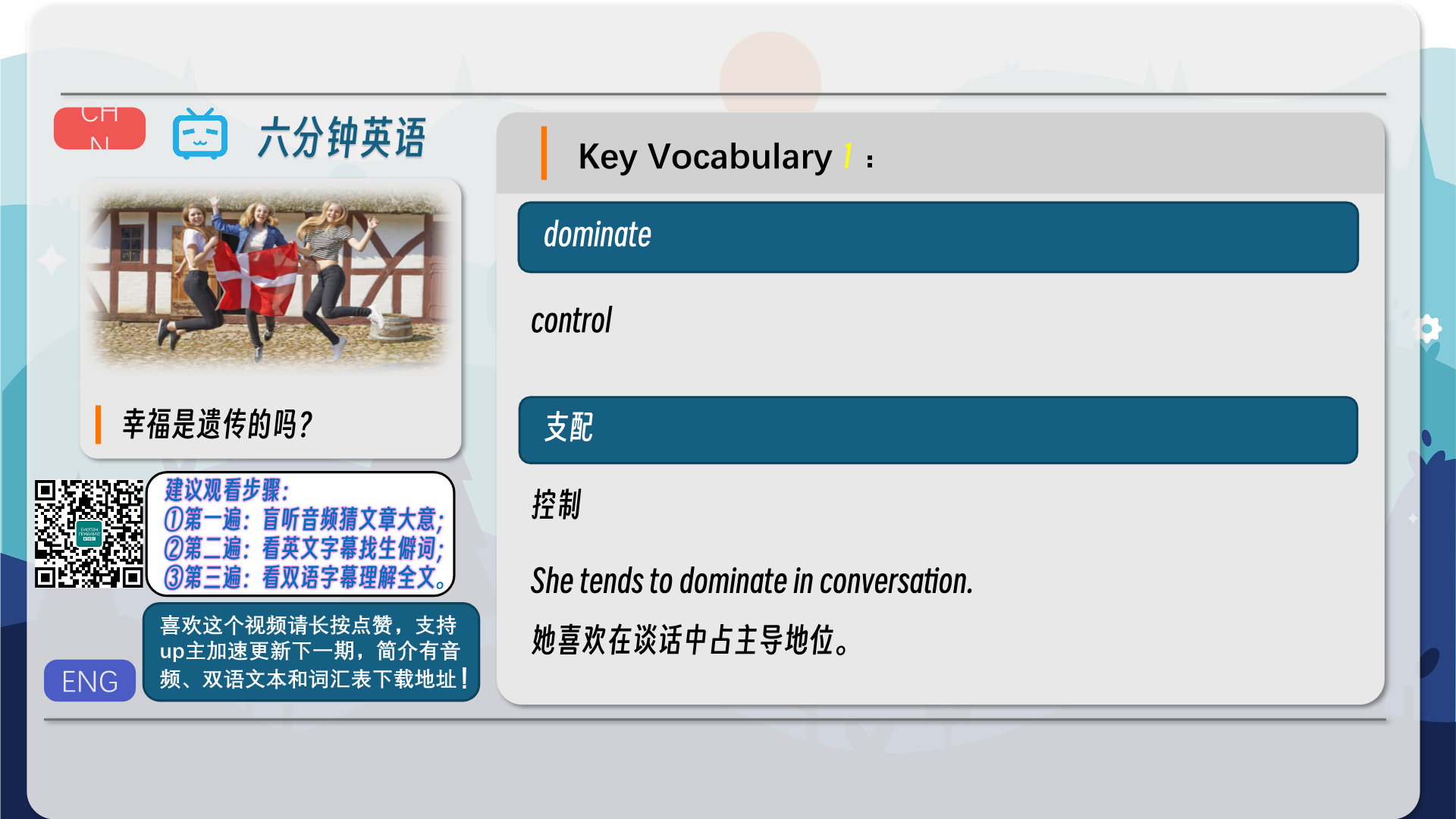
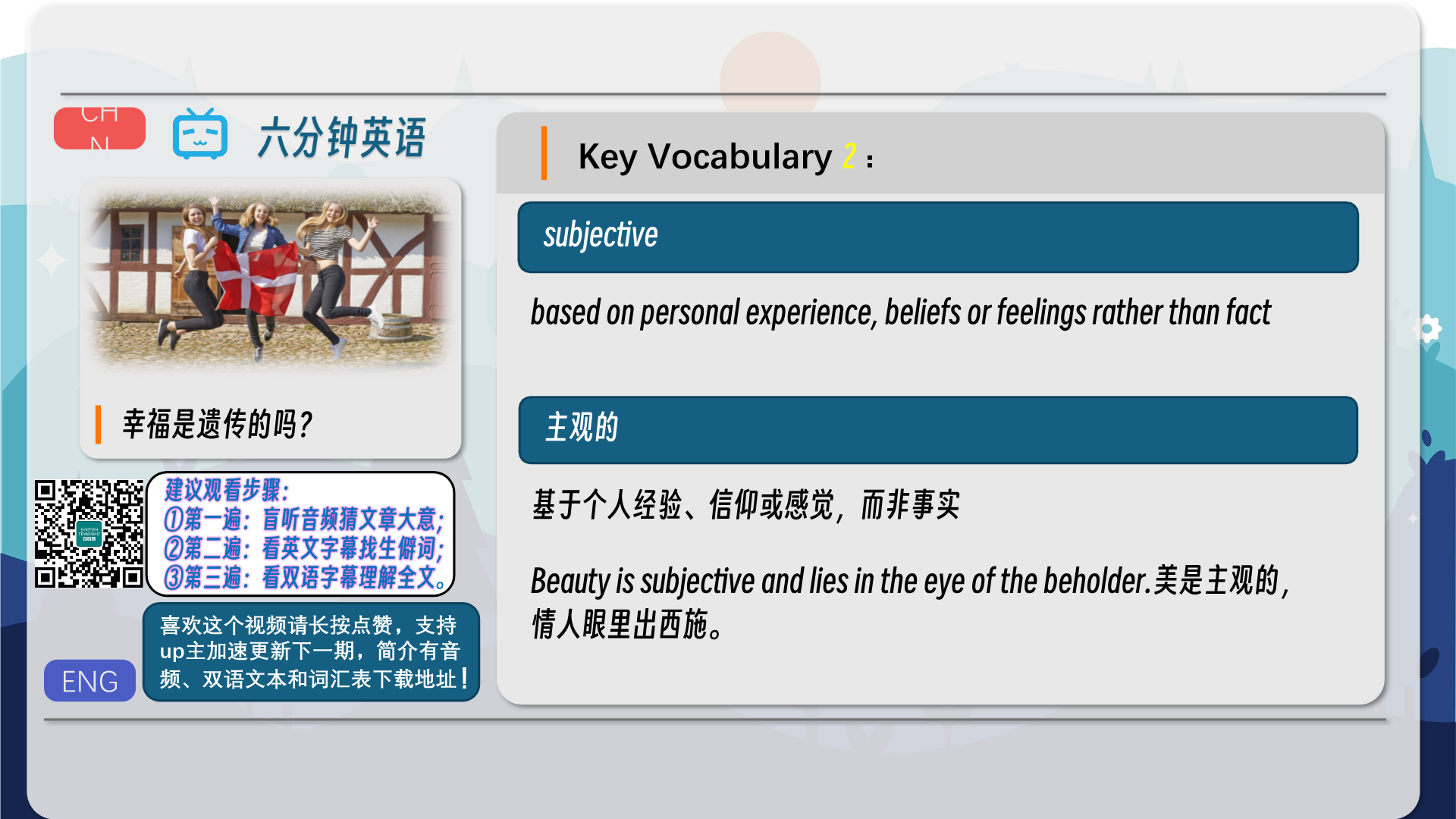
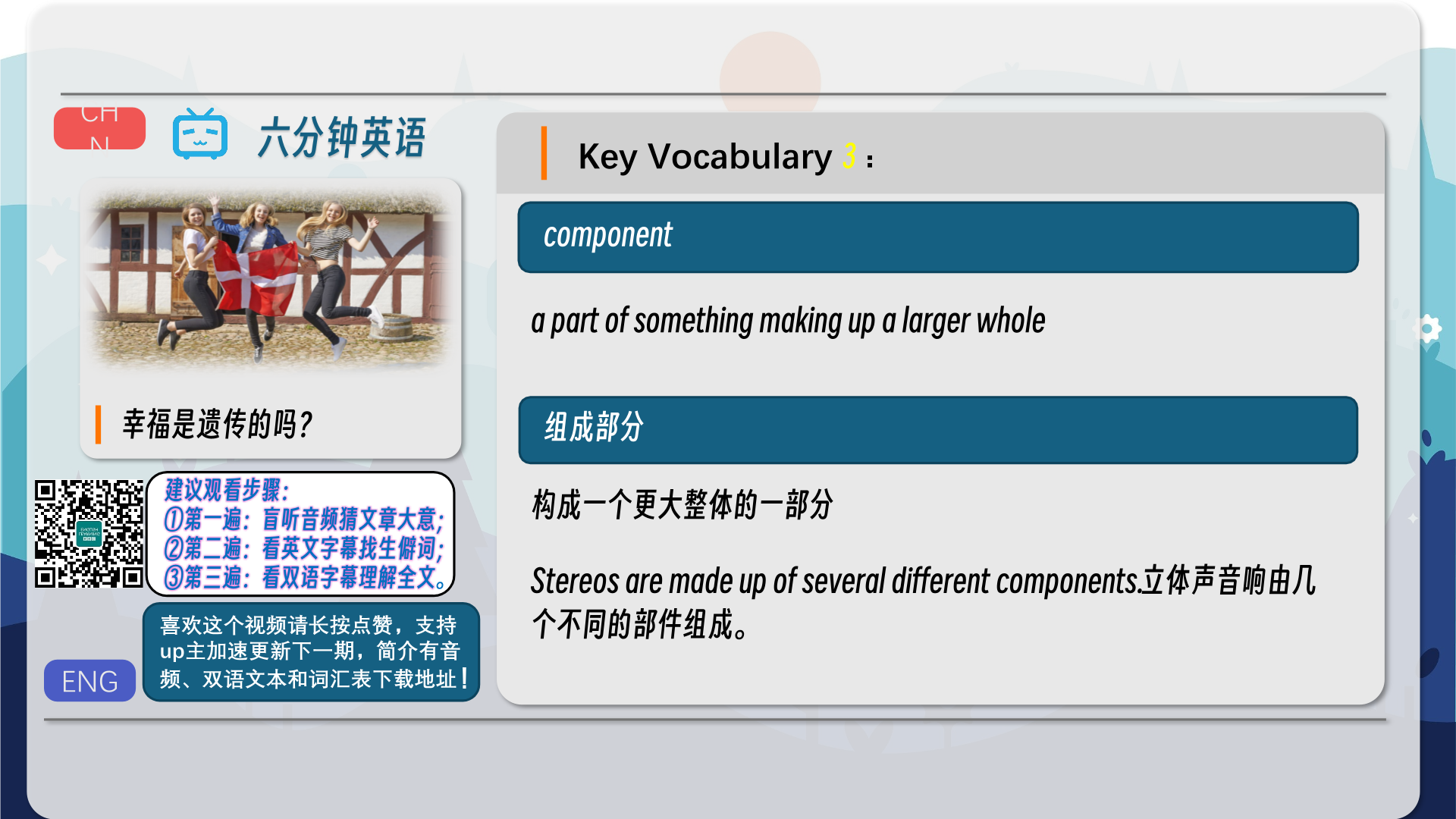
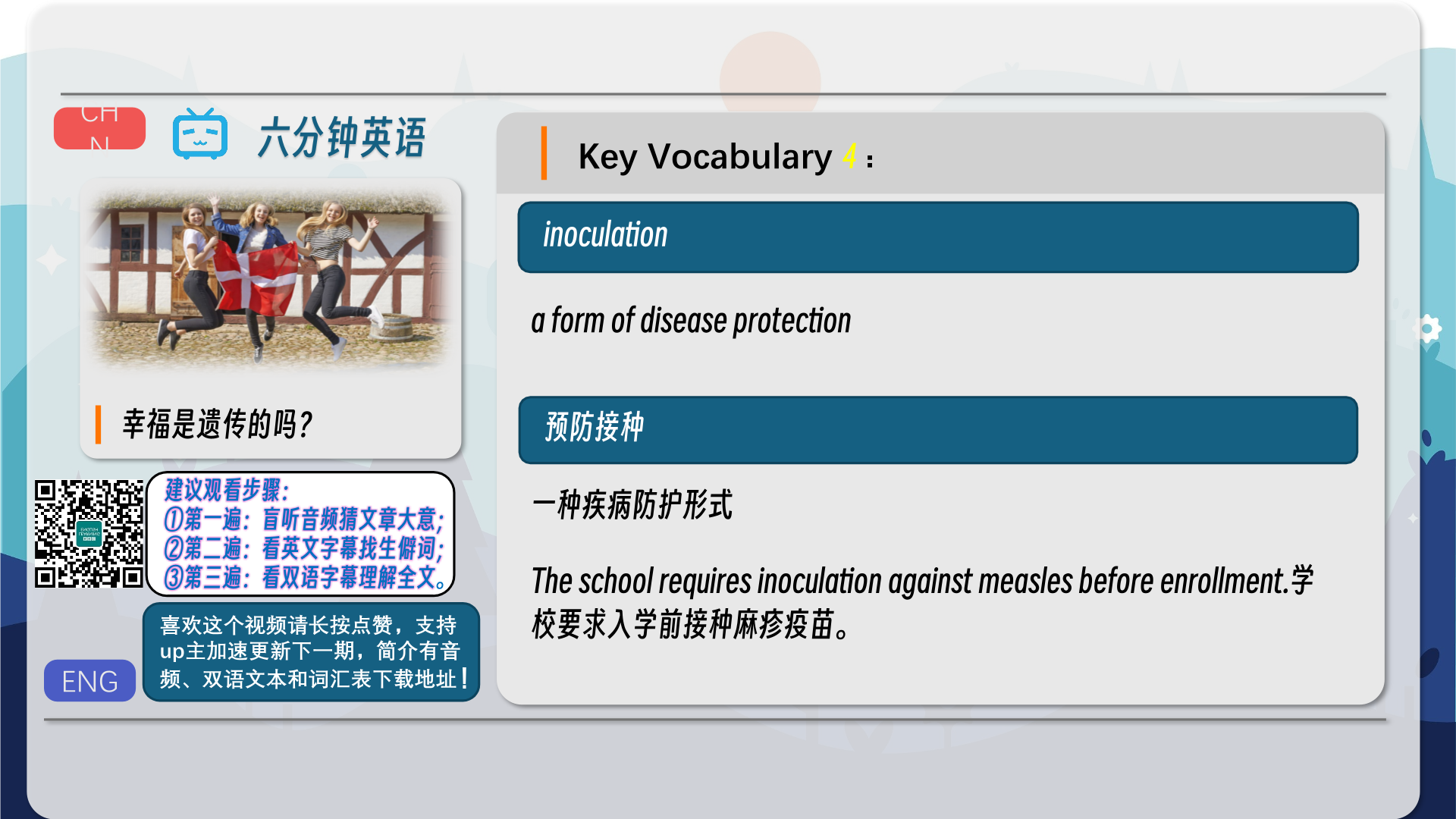
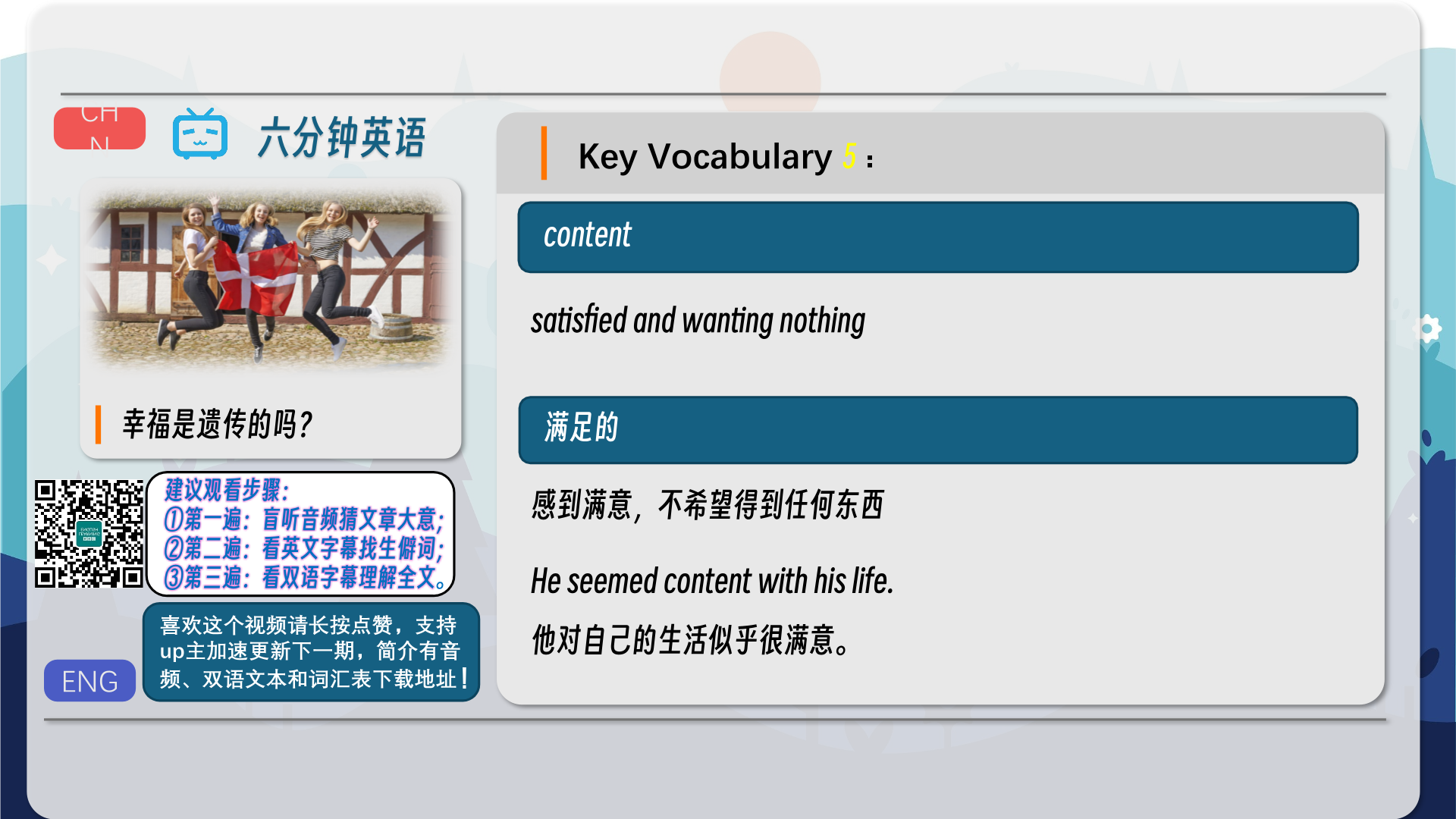
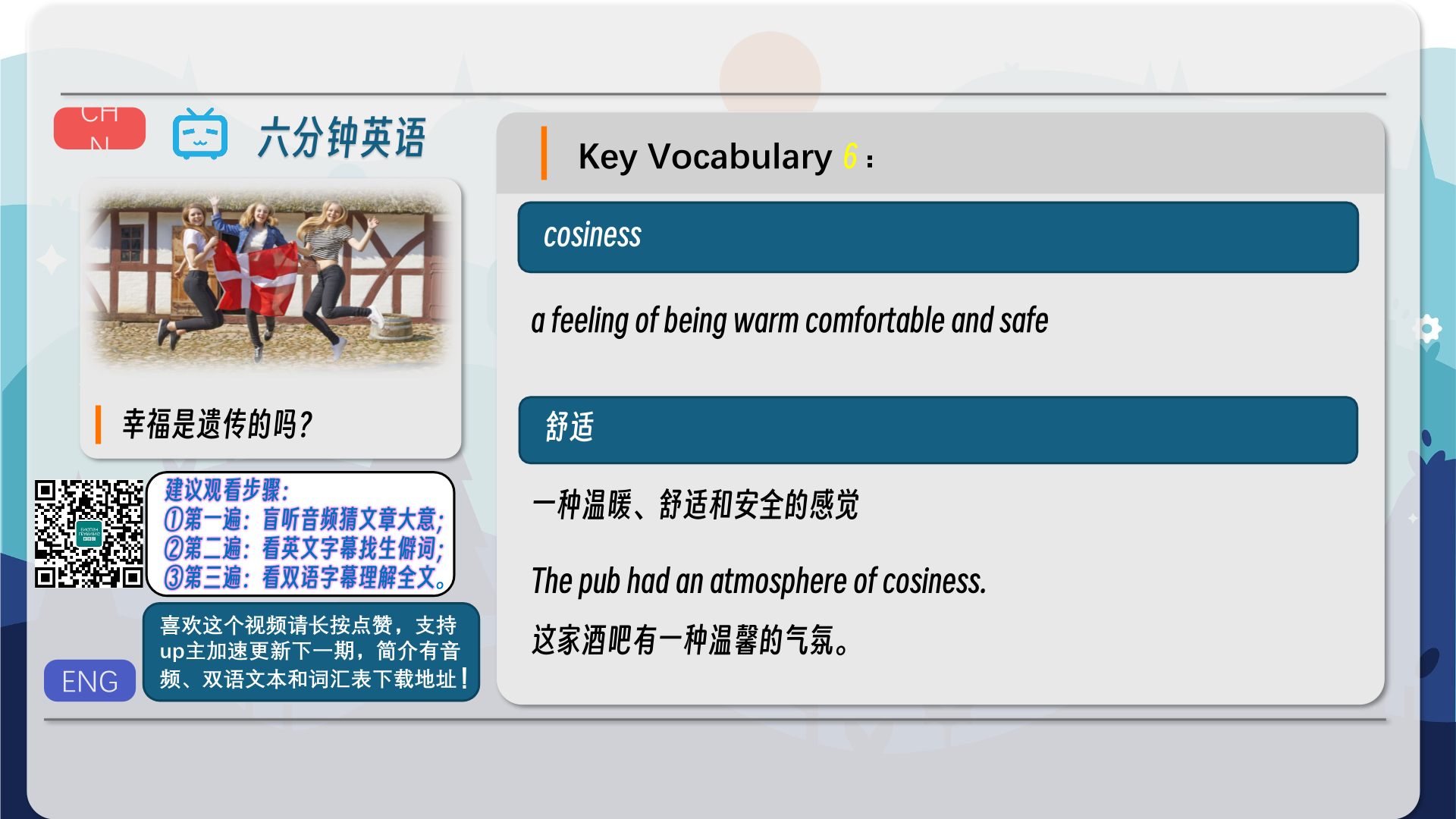
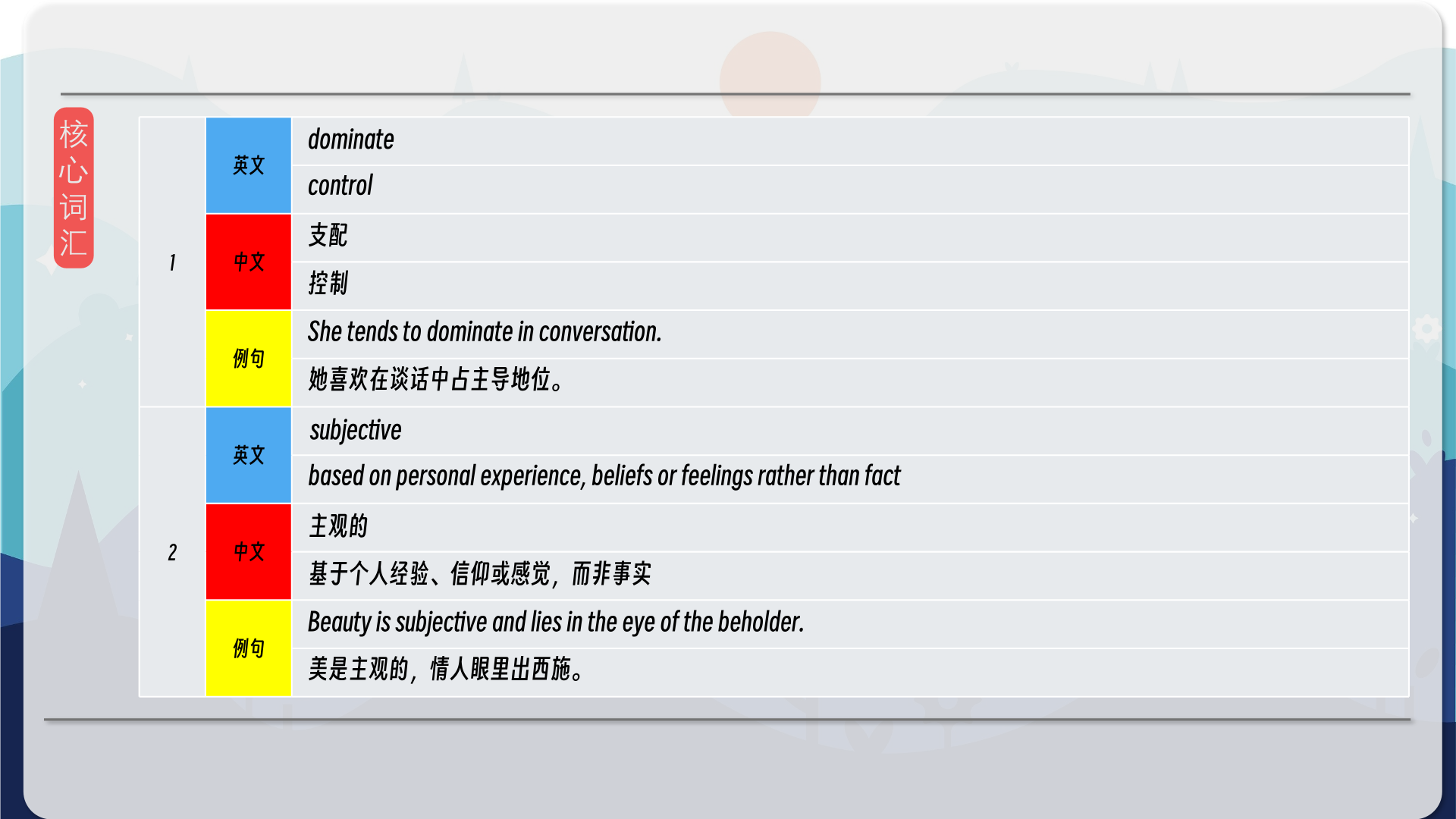
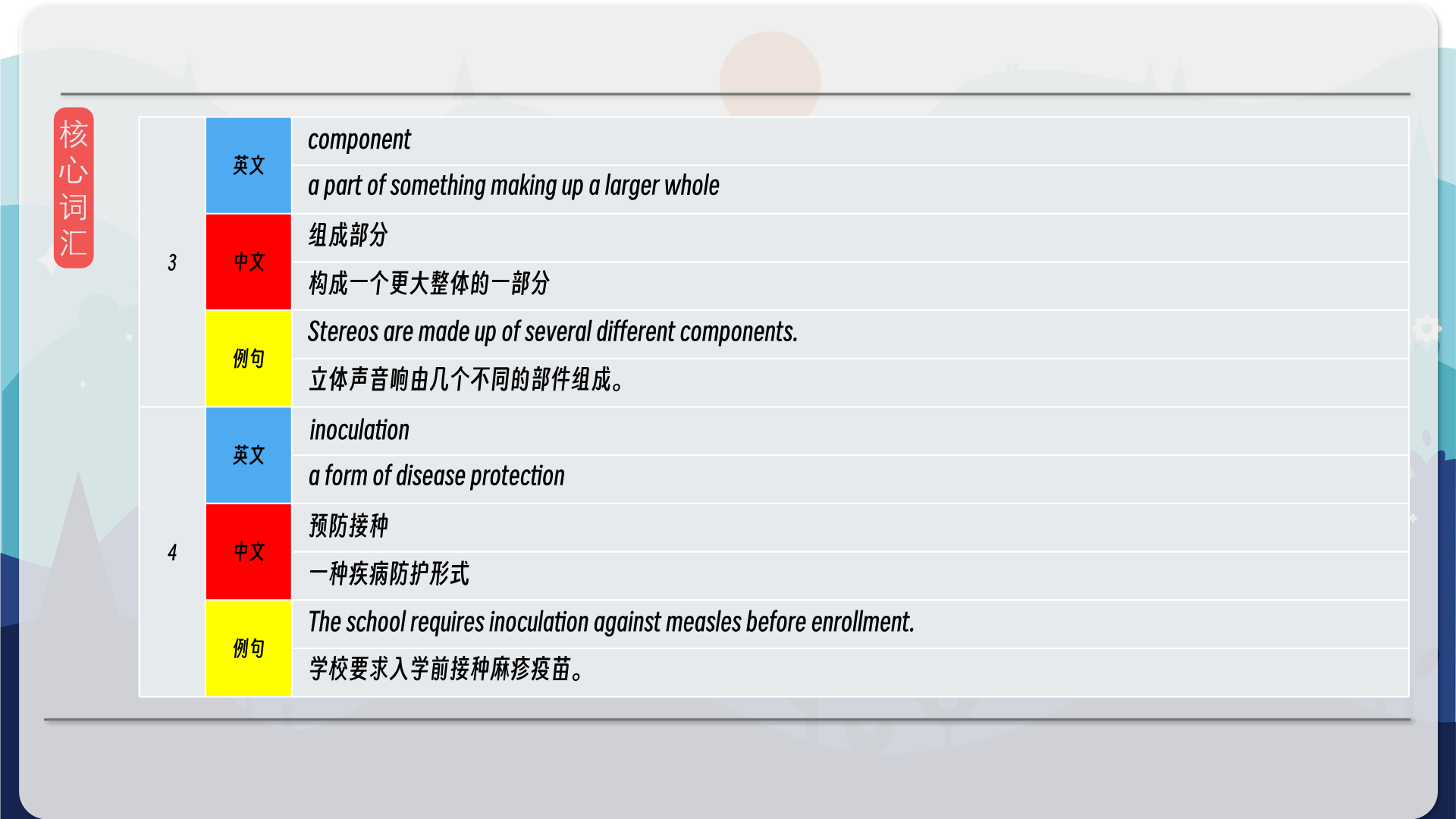
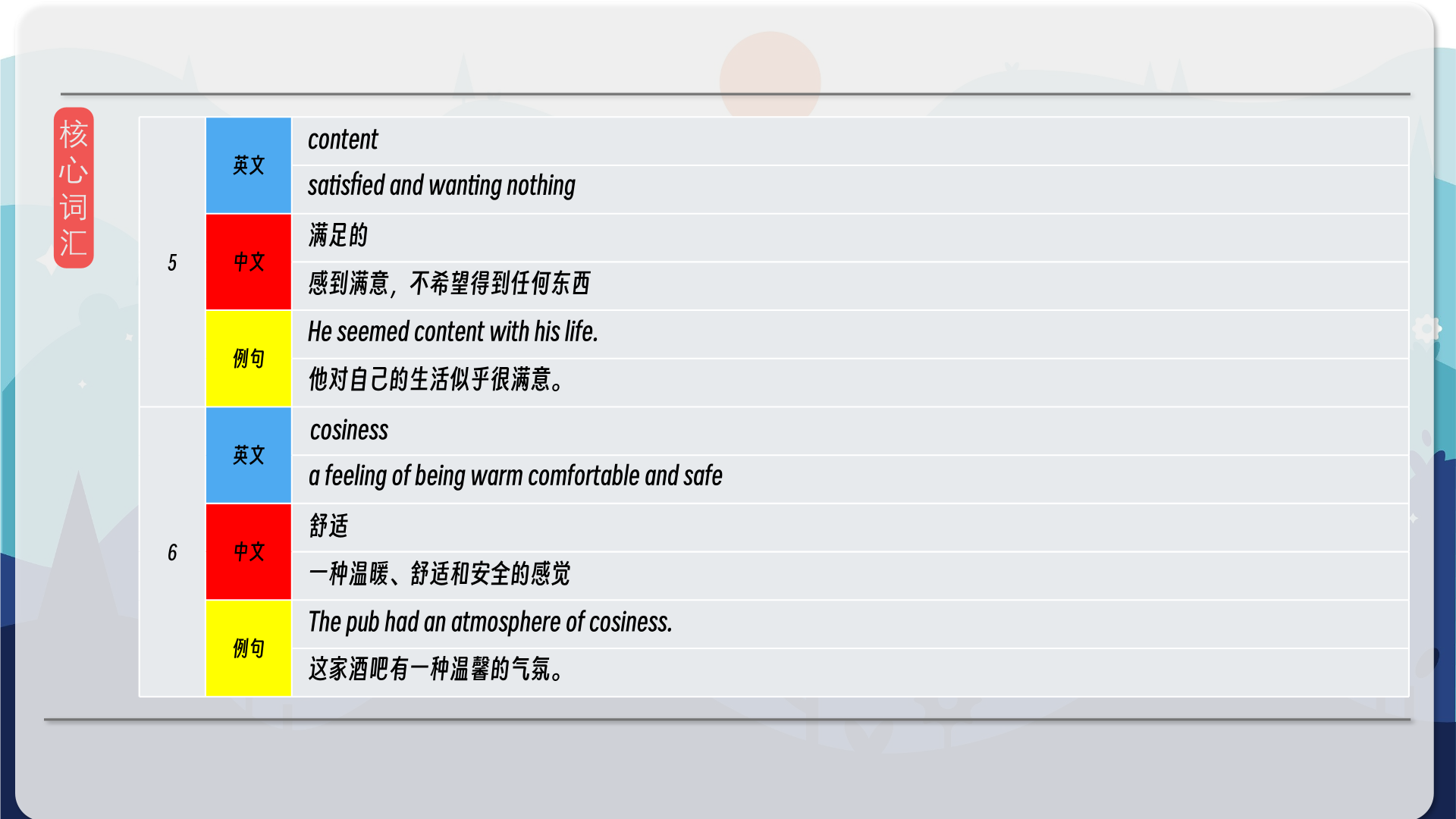
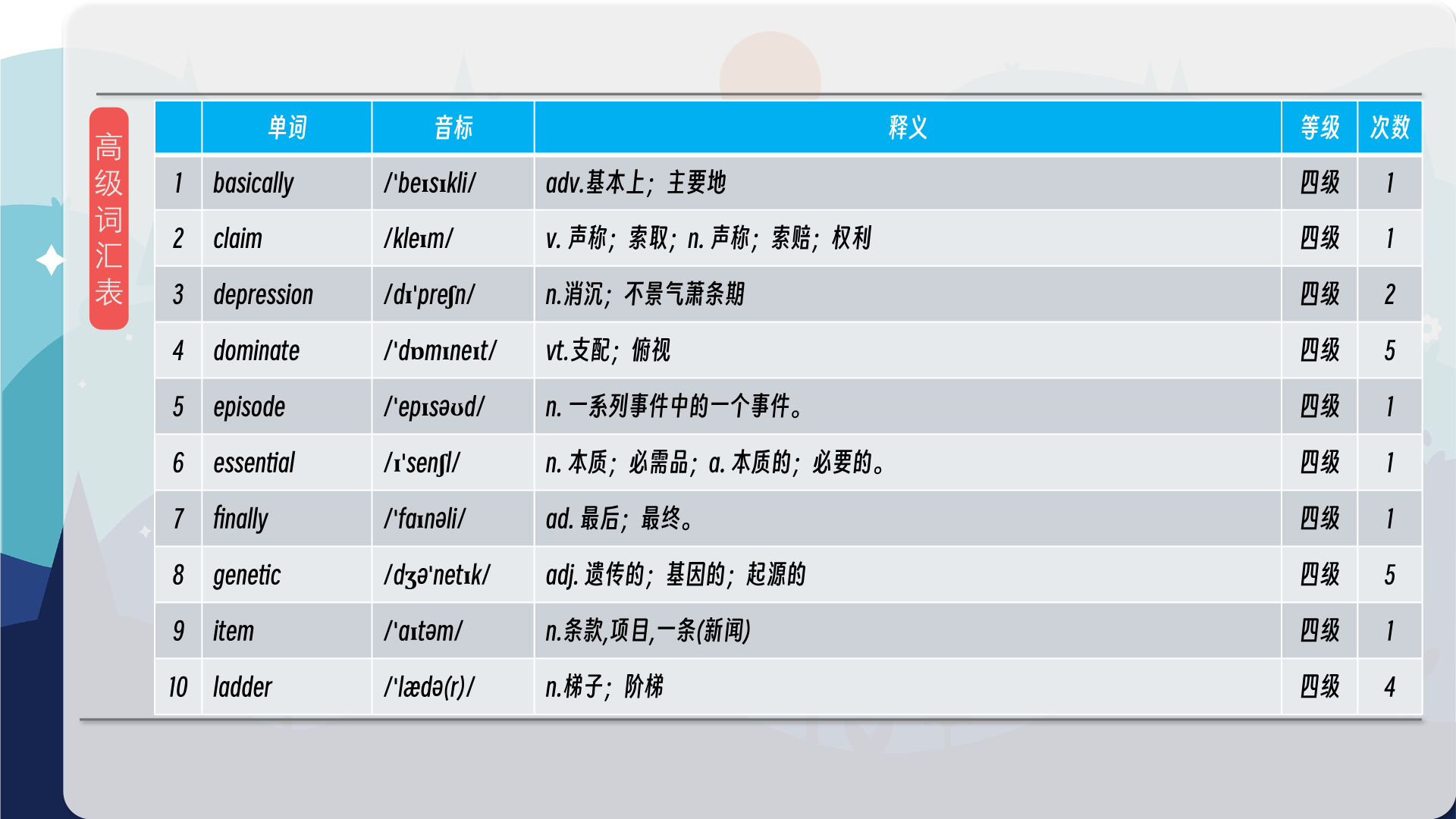
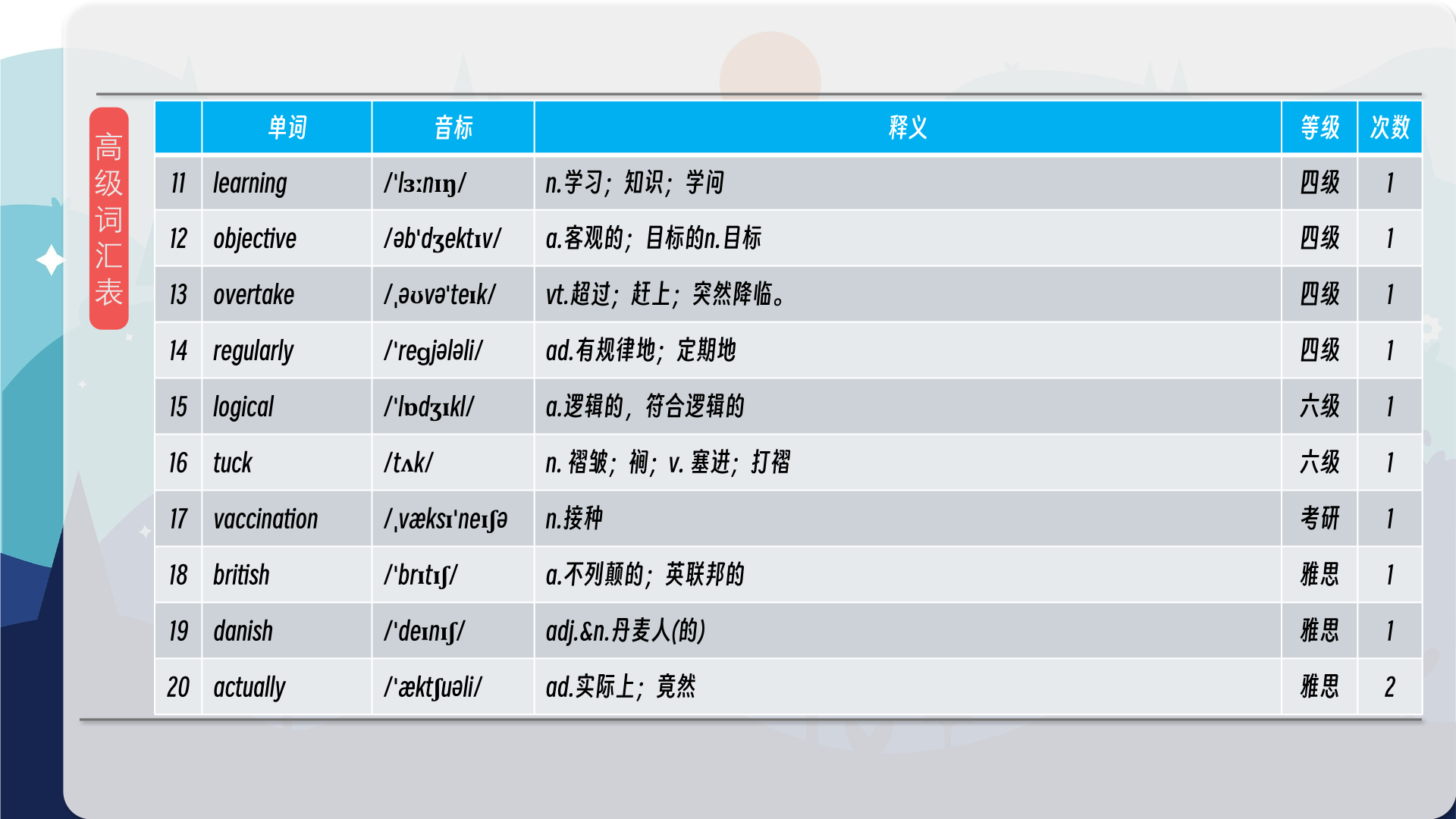
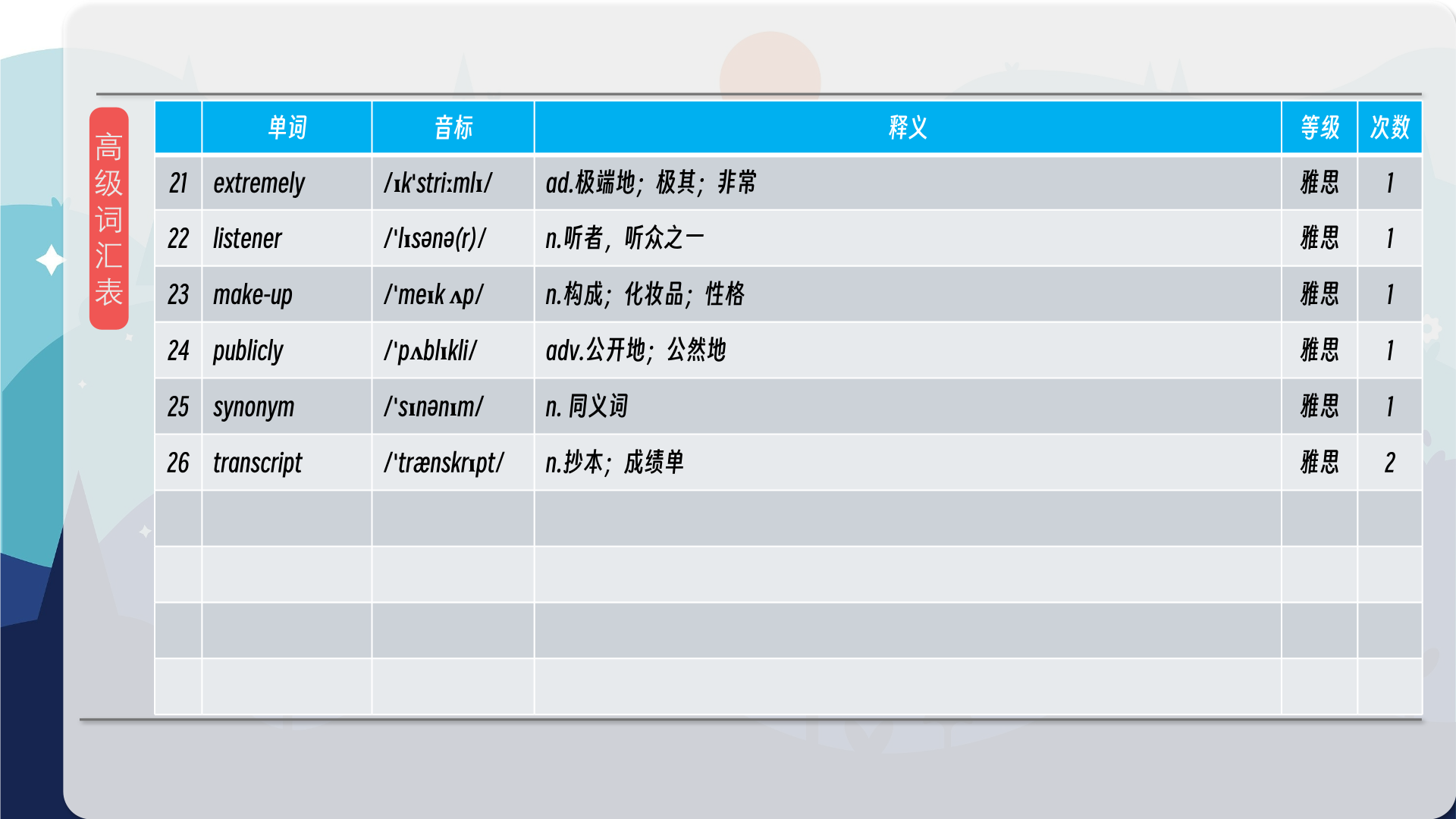

【核心词汇】
dominate
control
支配
控制
She tends to dominate in conversation.
她喜欢在谈话中占主导地位。
subjective
based on personal experience, beliefs or feelings rather than fact
主观的
基于个人经验、信仰或感觉,而非事实
Beauty is subjective and lies in the eye of the beholder.
美是主观的,情人眼里出西施。
component
a part of something making up a larger whole
组成部分
构成一个更大整体的一部分
Stereos are made up of several different components.
立体声音响由几个不同的部件组成。
inoculation
a form of disease protection
预防接种
一种疾病防护形式
The school requires inoculation against measles before enrollment.
学校要求入学前接种麻疹疫苗。
content
satisfied and wanting nothing
满足的
感到满意,不希望得到任何东西
He seemed content with his life.
他对自己的生活似乎很满意。
cosiness
a feeling of being warm comfortable and safe
舒适
一种温暖、舒适和安全的感觉
The pub had an atmosphere of cosiness.
这家酒吧有一种温馨的气氛。
在公众号里输入6位数字,获取【对话音频、英文文本、中文翻译、核心词汇和高级词汇表】电子档,6位数字【暗号】在文章的最后一张图片,如【220728】,表示22年7月28日这一期。公众号没有的文章说明还没有制作相关资料。年度合集在B站【六分钟英语】工房获取,每年共计300+文档,感谢支持!